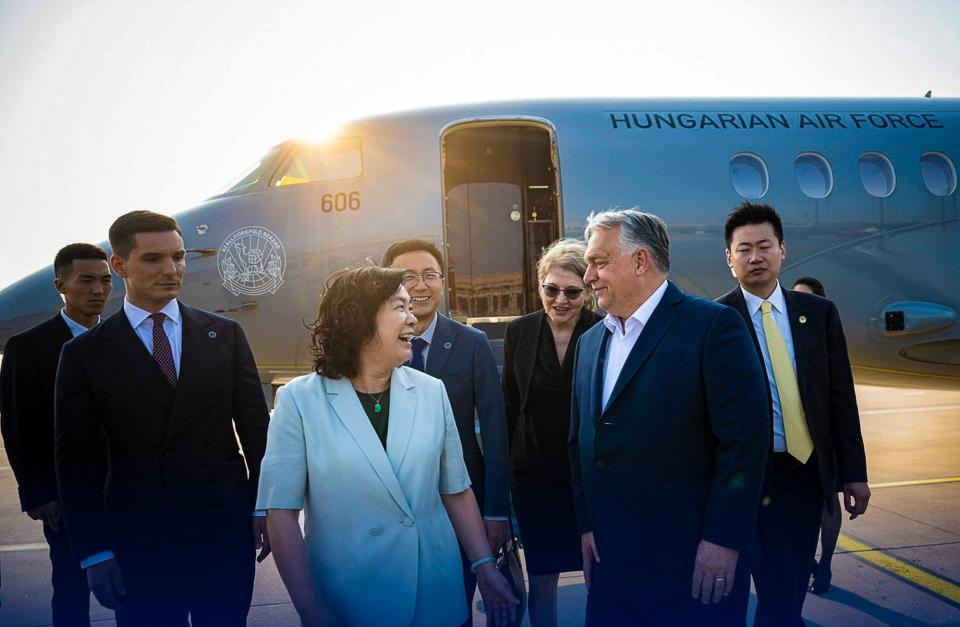Xi calls for Ukraine ceasefire as Hungary's Orban makes surprise stop in China
Chinese President Xi Jinping called for a ceasefire in Ukraine and direct dialogue between Moscow and Kyiv during talks with Hungarian Prime Minister Viktor Orban on Monday.
Hungary's leader was making a surprise visit to Beijing as part of his "peace mission" for Ukraine. It came after Orban visited Kyiv and Moscow for the first time since Russia invaded its neighbour in 2022.
Budapest has stepped up mediation efforts after taking over the rotating presidency of the European Council this month. But its proposal for a ceasefire and negotiations did not attract much interest from the two warring states last week.
Do you have questions about the biggest topics and trends from around the world? Get the answers with SCMP Knowledge, our new platform of curated content with explainers, FAQs, analyses and infographics brought to you by our award-winning team.
The Central European nation maintains close ties with both Russia and China and supports Beijing's peacemaking efforts on Ukraine, including a proposal with Brazil in May calling for conditions to be created for direct negotiations between Moscow and Kyiv.

Hungarian leader Viktor Orban is greeted by Hua Chunying, Chinese foreign vice-minister, after arriving in Beijing. Photo: X/@PM_ViktorOrban alt=Hungarian leader Viktor Orban is greeted by Hua Chunying, Chinese foreign vice-minister, after arriving in Beijing. Photo: X/@PM_ViktorOrban>
In Beijing on Monday, Xi praised Orban's efforts after the Hungarian leader briefed him about his visits to Kyiv and Moscow. He said China and Hungary would maintain communication on Ukraine as their peace efforts were largely "aligned".
"China has been actively promoting peace talks in its own way and encourages and supports all efforts conducive to peaceful resolution of the crisis," Xi said, according to state news agency Xinhua.
"It is in the interests of all parties to have a ceasefire and end the war at an early date and seek a political solution," Xi said.
"The international community should create conditions and provide assistance for the two sides to resume direct dialogue and negotiations. Only when all major powers exert positive energy instead of negative energy will this conflict see the dawn of a ceasefire."
Orban told Xi he appreciated China's efforts and that Beijing's advocacy for peace had "great importance", according to a video clip from the meeting posted on Orban's official Instagram account.
In a separate post on Facebook, Orban said China was a "key player" to bring peace to Ukraine. "In addition to the warring parties, it depends on the decision of three world powers, the United States, the European Union and China, when the Russian-Ukrainian war will end," he wrote.
Hungary has been at odds with the European Union's support for Ukraine as it blocked and delayed aid to the war-torn country. Orban's meeting with Russian President Vladimir Putin last week was harshly criticised by the bloc and fellow member states, with European Council President Charles Michel saying Hungary had "no mandate" to engage with Russia on behalf of the EU.
Orban's peace mission comes as the bloc has been increasingly divided on support for Ukraine. His hard-right party is also in the process of forming what could be the dominant right-wing alliance in the European Parliament, including France's National Rally party led by Marine Le Pen, which opposes continued funding for Kyiv.
Orban's next stop is Washington, where Western leaders will gather to discuss Ukraine at a Nato summit that begins on Tuesday.
Like Hungary, China's position on Ukraine has also met with a wary eye from the EU, which has sanctioned some Chinese companies over their links to Russia.
However, many EU officials are still looking to Beijing to play a peacemaker role given its influence in the Global South and Xi's personal ties with Putin. The pair discussed Ukraine when they met on the sidelines of the Shanghai Cooperation Organisation summit in Kazakhstan last week.
But neither China nor Russia were at last month's Ukraine peace summit in Switzerland. Beijing refused to attend because Moscow was excluded from the talks, and Ukrainian President Volodymyr Zelensky accused China of working with Russia to undermine the summit.
In Beijing on Monday, Xi also urged Hungary to help promote China-EU relations - which remain tense over their trade disputes - during its rotating presidency.
Orban agreed to maintain strategic coordination with China and said Hungary opposed "bloc confrontation", according to the Xinhua report.
Xi also called for both nations to strengthen political trust and expand cooperation under Beijing's Belt and Road Initiative, saying China's deepening economic reform would provide new opportunities for bilateral ties.
The two leaders last met in May when Xi visited Hungary during his first European tour - which also took in France and Serbia - since the Covid-19 pandemic.
When Xi was in Budapest, the two nations elevated ties to an "all-weather" comprehensive strategic partnership - a status reserved for nations Beijing trusts the most such as Belarus, Pakistan and Venezuela.
This article originally appeared in the South China Morning Post (SCMP), the most authoritative voice reporting on China and Asia for more than a century. For more SCMP stories, please explore the SCMP app or visit the SCMP's Facebook and Twitter pages. Copyright © 2024 South China Morning Post Publishers Ltd. All rights reserved.
Copyright (c) 2024. South China Morning Post Publishers Ltd. All rights reserved.